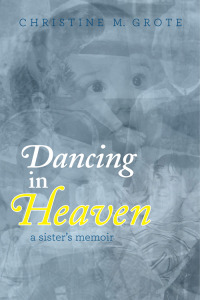 Today we have a sneak peek from author Christine Grote’s memoir, Dancing in Heaven.
Today we have a sneak peek from author Christine Grote’s memoir, Dancing in Heaven.
Annie’s parents thought she was a perfectly normal child with bright eyes and a ready smile until she was about nine months old and not sitting up. They soon found out that Annie had been born with profound brain damage, and probably wouldn’t live more than eight years. “Take her home and love her,” the doctors said.
So that’s what they did.
For 51 years.
A testament to the intrinsic value of human life, Dancing in Heaven is the story of Annie’s life, death, and her significance in the lives of those who loved her.
Dancing in Heaven is available at Amazon.com, Amazon UK, Smashwords, Barnes & Noble and other major online retailers.
And now, an excerpt from Dancing in Heaven…
Dr. Ryan shows up at the house carrying his black medical bag. He listens to Annie with his stethoscope and hears a slight rattle in her chest—the remnants of last month’s bronchitis. “She needs to stay on the antibiotic,” he says. “And she looks like she could use a little help with the fluids.”
As he leaves Dr. Ryan says, “You know the time comes when we all have to die. It’s because of the exceptional care you’ve given her that she’s lived all these fifty-some years. You’re doing everything that you can for her.”
Mom becomes determined to get fluids down Annie. She has set a timer to go off at 30-minute intervals, when she will try to get Annie to drink another ounce or two from the bottle of sweet tea she squeezes into her mouth a few drops at a time.
Mom takes Annie’s temperature and it’s still 100 degrees. Annie throws up some of the small amount of liquid she drank a few minutes earlier.
Dad and I sit at the kitchen table, not able to find any way to be helpful. “When I took her to Columbus Children’s Hospital shortly after she was born,” Dad says, “your mother fed her every ten minutes so that she would eat what the doctors required for her release.”
Mom wasn’t seventy-five-years old when they took Annie to Columbus, I think. The 30-minute timer goes off, and Mom tries to get Annie to drink a few more ounces of liquid.
Annie throws up.
Mom buries her head in her hands at the kitchen table and says, “I am tired of trying to make decisions about what to do when I don’t know what to do.”
“We keep pushing liquids, like the doctor said,” Dad responds.
The 30-minute timer goes off and Mom fills another bottle with sugar water.
I wonder how long my mother can keep up this pace.
Carol tells me she tries to communicate with Annie’s soul and spirit. “Annie’s soul is tired,” she says.
Dad tells me when he puts Annie to bed every night he has a hard time leaving the room—leaving her alone. He tells me he had a dream that he hopes he never has to live to see— the day when he has to see Annie in a coffin.
“I hope I never have to see the day after both you and Mom are gone and Annie is looking for you, not understanding, and waiting for you to return,” I say.
Carol says, “Annie’s spirit and soul are not suffering like her physical body is right now.”
Mom walks over and looks at the chart she’s made of Annie’s medicines. “It’s time for her antibiotic again,” she says.
Mom sets the timer for another 30 minutes.
Dad prays Novenas and Hail Marys.
I chase visions of an empty wheelchair from my mind.
Carol sees Annie in a golden light—dancing to Neil Diamond.
______________________________

Sounds like a real heart grabber.
Thanks for stopping by and commenting, Yvonne. Readers have told me so.
Sounds like an inspiring memoir
Hi Mary,
You have my mother’s name. I think people who have read Dancing in Heaven have been inspired by it. I think the people who knew my parents and Annie were inspired by their lives. Thanks for stopping by.
A testament to what love can do.
Yes. I suppose it is. Thank you, Teresa.